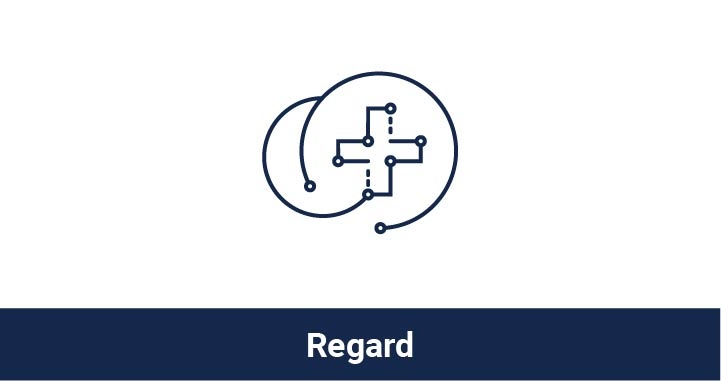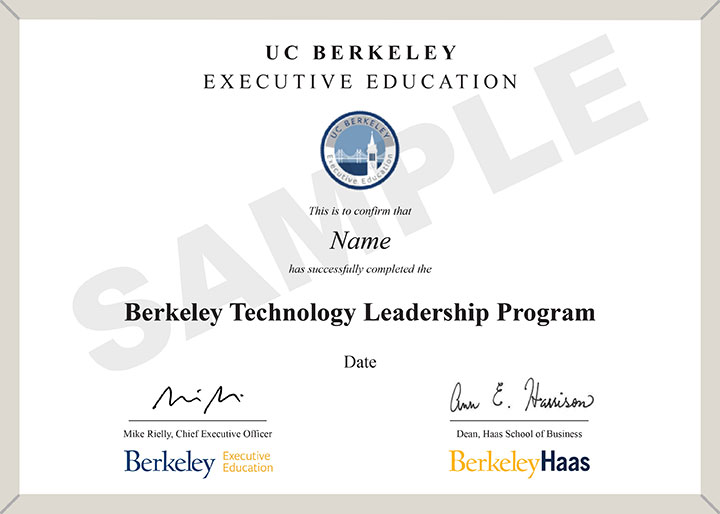This six-month technology program consists of four pillars. Through a mix of live lectures, small group exercises, case study analyses, and self-reflection, you will advance your leadership acumen.
Module 1:
Overview of Digital Transformation
In this opening module, you will get an overview of digital innovations. You will learn about the various applications of digital strategies successfully adopted by global brands and
contemplate which strategies may prove to be the most effective in your organization.
Module 2:
Opportunities for Digital Transformation
In this module, you will discover how data can drive effective decision making through
case studies from industries such as advertising, retail, and health care. You will see
examples of techniques such as A/B testing, network analysis, and pre/post testing
being employed to deliver business outcomes, and you will learn to identify opportunities for
action in your own organization.
Module 3:
The Role of Data
This module will dive deeper into data by covering the three main categories of
analytics: descriptive, predictive, and prescriptive. You will identify the
opportunities and limitations of data integration and learn how concepts such as
data sourcing, data architecture, and data algorithms come together to form a holistic
data strategy for your organization.
Module 4:
The Process of Digital Transformation
Understand the current state of problems in your organization through the integration of
quantitative and qualitative methods. Envision digitally enabled transformations to your
processes, and identify the metrics for the success of such innovations.
Module 5:
Digital Business Models
Digital technologies have created more opportunities for organizing complex markets.
Understand the impact of digital transformation on business models. Assess digital
products against platforms and multisided markets.
Module 6:
People and the Organization
The right organizational structure can be instrumental in the success of your digital
transformation efforts. Assess the organizational design choices that affect an
organization's capacity for digital transformation.
Module 7:
Technology and Policy
With the rapidly increasing use of data and the accompanying concerns around
privacy violations, data collection regulations have come to the forefront. Explore the
ethical issues surrounding the use of personal data and how to navigate data
regulations.
Module 8:
Digital Transformation Action Plan
This module will explore recent trends in digital technologies and what opportunities the
future may bring. Summarize your learnings from previous modules, and start compiling
the building blocks for your capstone project.
Module 9:
Artificial Intelligence and Business
In this module, you will explore the various applications of AI in business and the
opportunities being created by advances in AI. Understand what AI is capable of, and
identify possibilities of implementing AI-driven solutions in your business.
Module 10:
Neural Networks and Deep Learning
Grasp the fundamentals of neural networks and deep learning along with their common applications. Evaluate business considerations for implementing these technologies, such as data acquisition, training objectives, and performance assessment. Additionally, explore advanced techniques such as generative AI for creating new data and convolutional neural networks (CNNs) for powerful analysis.
Module 11:
Computer Vision and Natural Language Processing
AI has enabled the automation of complex tasks through applications such as autonomous driving and chatbots. Delve into two cutting-edge fields that let machines "see" the world as we do and understand our language, including the challenges and possibilities these technologies present. Discover recent advancements in creating realistic images and text (GANs) and mastering sequential data such as speech (RNNs).
Module 12:
Robotics and Reinforcement Learning
Understand the nuances of reinforcement learning and the practical considerations for
it to succeed. Explore the applications of robotics, and evaluate the reliability required for robots to create value.
Module 13:
AI Strategy
Formulate a strategy for the implementation of AI in your organization. Learn from failed
AI implementations, and assess the value of AI-driven applications by using the 4Cs
Framework.
Module 14:
Leading an AI-driven Transformation in Your Organization
People and organizations play important roles in the implementation of your AI strategy. In this
module, you will uncover how to empower your organization to undergo this transformation
through a case study.
Module 15:
The Future of AI in Business
Acknowledge the moral and ethical concerns associated with the use of intelligent
machines and algorithmic decision making. Explore what the future of AI may look
like, including human–machine touchpoints and augmented intelligence, and reflect on how
AI plays a role in your digital transformation.
Module 16:
The Fintech Revolution
Understand how the evolution of technological innovations led to the creation of
immense opportunities in fintech. Explore the fintech landscape and the factors driving
its growth.
Module 17:
The Fintech Ecosystem
Identify the disruptive products that transformed the banking and financial sectors.
Articulate the major trends in fintech and the new opportunities to explore those trends.
Module 18:
The Economic Foundations of Fintech
Explore valuation theory ledger, blockchain, and cryptocurrencies, and understand their
applications in financial products and services. Look at network effects to understand
how they affect factors such as competition, profitability, and pricing, and propose
strategies to generate network effects in fintech.
Module 19:
Fintech Idea to Execution
Drive a fintech idea to execution by applying the Business Model Canvas. This module
will cover all of the steps, including valuation, raising capital, and implementation
planning.
Module 20:
Capstone
In this final module, you will create a pitch deck for a digital transformation that offers a
solution to a problem you have identified at your organization. As part of this
proposal, you will also address the change management piece and how you would
ensure a successful rollout.
Module 1:
Overview of Digital Transformation
In this opening module, you will get an overview of digital innovations. You will learn about the various applications of digital strategies successfully adopted by global brands and
contemplate which strategies may prove to be the most effective in your organization.
Module 11:
Computer Vision and Natural Language Processing
AI has enabled the automation of complex tasks through applications such as autonomous driving and chatbots. Delve into two cutting-edge fields that let machines "see" the world as we do and understand our language, including the challenges and possibilities these technologies present. Discover recent advancements in creating realistic images and text (GANs) and mastering sequential data such as speech (RNNs).
Module 2:
Opportunities for Digital Transformation
In this module, you will discover how data can drive effective decision making through
case studies from industries such as advertising, retail, and health care. You will see
examples of techniques such as A/B testing, network analysis, and pre/post testing
being employed to deliver business outcomes, and you will learn to identify opportunities for
action in your own organization.
Module 12:
Robotics and Reinforcement Learning
Understand the nuances of reinforcement learning and the practical considerations for
it to succeed. Explore the applications of robotics, and evaluate the reliability required for robots to create value.
Module 3:
The Role of Data
This module will dive deeper into data by covering the three main categories of
analytics: descriptive, predictive, and prescriptive. You will identify the
opportunities and limitations of data integration and learn how concepts such as
data sourcing, data architecture, and data algorithms come together to form a holistic
data strategy for your organization.
Module 13:
AI Strategy
Formulate a strategy for the implementation of AI in your organization. Learn from failed
AI implementations, and assess the value of AI-driven applications by using the 4Cs
Framework.
Module 4:
The Process of Digital Transformation
Understand the current state of problems in your organization through the integration of
quantitative and qualitative methods. Envision digitally enabled transformations to your
processes, and identify the metrics for the success of such innovations.
Module 14:
Leading an AI-driven Transformation in Your Organization
People and organizations play important roles in the implementation of your AI strategy. In this
module, you will uncover how to empower your organization to undergo this transformation
through a case study.
Module 5:
Digital Business Models
Digital technologies have created more opportunities for organizing complex markets.
Understand the impact of digital transformation on business models. Assess digital
products against platforms and multisided markets.
Module 15:
The Future of AI in Business
Acknowledge the moral and ethical concerns associated with the use of intelligent
machines and algorithmic decision making. Explore what the future of AI may look
like, including human–machine touchpoints and augmented intelligence, and reflect on how
AI plays a role in your digital transformation.
Module 6:
People and the Organization
The right organizational structure can be instrumental in the success of your digital
transformation efforts. Assess the organizational design choices that affect an
organization's capacity for digital transformation.
Module 16:
The Fintech Revolution
Understand how the evolution of technological innovations led to the creation of
immense opportunities in fintech. Explore the fintech landscape and the factors driving
its growth.
Module 7:
Technology and Policy
With the rapidly increasing use of data and the accompanying concerns around
privacy violations, data collection regulations have come to the forefront. Explore the
ethical issues surrounding the use of personal data and how to navigate data
regulations.
Module 17:
The Fintech Ecosystem
Identify the disruptive products that transformed the banking and financial sectors.
Articulate the major trends in fintech and the new opportunities to explore those trends.
Module 8:
Digital Transformation Action Plan
This module will explore recent trends in digital technologies and what opportunities the
future may bring. Summarize your learnings from previous modules, and start compiling
the building blocks for your capstone project.
Module 18:
The Economic Foundations of Fintech
Explore valuation theory ledger, blockchain, and cryptocurrencies, and understand their
applications in financial products and services. Look at network effects to understand
how they affect factors such as competition, profitability, and pricing, and propose
strategies to generate network effects in fintech.
Module 9:
Artificial Intelligence and Business
In this module, you will explore the various applications of AI in business and the
opportunities being created by advances in AI. Understand what AI is capable of, and
identify possibilities of implementing AI-driven solutions in your business.
Module 19:
Fintech Idea to Execution
Drive a fintech idea to execution by applying the Business Model Canvas. This module
will cover all of the steps, including valuation, raising capital, and implementation
planning.
Module 10:
Neural Networks and Deep Learning
Grasp the fundamentals of neural networks and deep learning along with their common applications. Evaluate business considerations for implementing these technologies, such as data acquisition, training objectives, and performance assessment. Additionally, explore advanced techniques such as generative AI for creating new data and convolutional neural networks (CNNs) for powerful analysis.
Module 20:
Capstone
In this final module, you will create a pitch deck for a digital transformation that offers a
solution to a problem you have identified at your organization. As part of this
proposal, you will also address the change management piece and how you would
ensure a successful rollout.
This program may include optional reading material that requires a paid subscription.












































